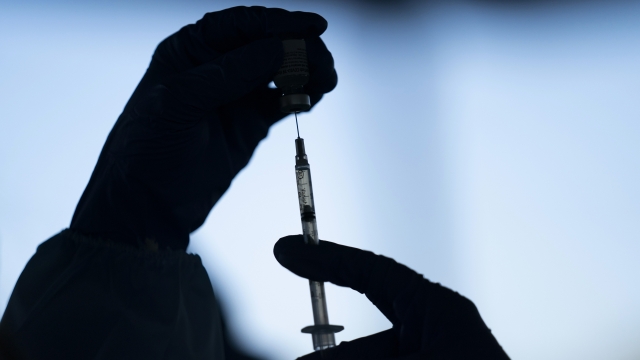Some top scientists are warning about not taking the omicron variant seriously, as preliminary data from a Pfizer study shows increased protection against the strain with booster doses.
The CDC expanded its recommendations on booster shots Thursday, now encouraging everyone 16 and older to get a third dose at least 6 months after the initial two-dose Pfizer series.
“Although we don’t have all the answers on the Omicron variant, initial data suggests that COVID-19 boosters help broaden and strengthen the protection against Omicron and other variants,” said Dr. Rochelle Walensky, director of the Centers for Disease Control and Prevention.
Dr. Eric Feigl-Ding, an epidemiologist and senior fellow with the Federation of American Scientists, called for the CDC to expand those recommendations before the announcement. He says omicron presents multiple concerns, noting that only about 25% of eligible Americans are boosted. Feigl-Ding warns we could be headed toward a 2.0 pandemic with omicron, despite many reports that people sick with the omicron strain are experiencing milder symptoms.
“When people sometimes talk about severity, they ignore the fact that what actually kills more people and hospitalizes more people is not a more severe virus by itself, but a virus that is 'mild,' but that is that much more infectious and evasive and infects millions more,” Feigl-Ding said. “That will ultimately sicken and send more people to the hospital than a virus more severe by itself.”
Dr. Eric Topol, founder and director of the Scripps Research Translational Institute, published his thoughts on omicron, saying there are mixed signals. He says it’s clearly more immune evasive than any prior variant, and writes that omicron will prolong the pandemic. On severity of illness, Topol references early reports from South Africa that point to milder cases, but says the cases studied were in predominantly young people or had immunity from previous infection or vaccination.
Walensky said data on omicron is very limited, but that disease is mild in almost all of the confirmed omicron cases in the U.S. so far.
Feigl-Ding said even if omicron is milder than delta, so too was the original COVID-19 strain that still killed millions of people.
“We cannot be lulled into complacency. We cannot be blasé about the response. And I think lots of the misinformation calling it, ‘Oh, omicron is so mild. It's like nature's vaccine.’ No, do not accept that,” Feigl-Ding said. “It is still a very dangerous virus and a virus that’s much more contagious and evasive and that's why we have to build a higher seawall than what we've ever had before in order to hold the flood back.”
Feigl-Ding says the U.S. should be taking note of what’s happening in the United Kingdom, where cases of omicron are doubling less than every two days, with the country adding another 249 cases Thursday. Prime Minister Boris Johnson announced what he calls “Plan B” Wednesday, which means urging people in England to work from home, requiring masks in indoor venues and vaccine requirements for large venues like sports stadiums.
The threat of omicron in the U.S. comes as pockets of the country are dealing with surges in delta cases, the variant that currently makes up more than 99% of U.S. COVID-19 cases. Data from Biobot Analytics shows a higher concentration of CoV-2 virus in wastewater nationwide than ever before in the pandemic, with sharp rises in jurisdictions from Colorado to Massachusetts.
Feigl-Ding says more needs to be done to fight both delta and omicron, including getting more boosters in arms, reclassifying fully vaccinated as three shots and wearing more protective masks like N95s.
“We know that if two shots are not enough, that means we are facing another time crunch to get people booster vaccinated. And that's the worry because winter is already here,” Feigl-Ding said. “Cases already on the rise. Wastewater is already on the rise. And I worry that this is a 2.0 pandemic virus, that we will maybe potentially see a surge in cases and hospitalizations that rivals if not exceeds last year. And this is why time is of the essence.”


